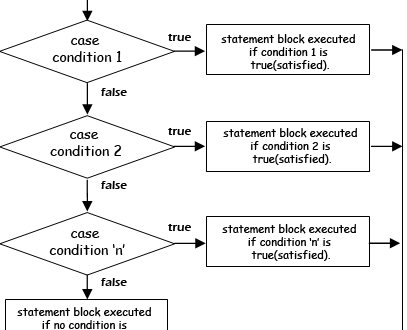
What if we want to print grades for all the students in all classes? Imagine that we have ten classes for grade 5. Let's take a step further and make our scenario a little bit complicated. For example, we can select both if-else and switch statements for the second scenario since we are just checking one report, which might not make any difference in performance except readability. It is easy to edit switch cases as they are recognized easily.Īccording to the above comparison, you can see the decision of which conditional statement to choose is depending on the scenario and its complexity. It is difficult to edit the if-else statement if the nested if-else statement is used It is used to test multiple values of the same variable or expression like 1, 2, 3, etc. It is used to evaluate a condition to be true or false. If the condition inside switch statements does not match with any of the cases, for that instance, the default statement is executed if created. If the condition inside if statements are false, then by default, the else statement is executed if created. Switch case statement executes one case after another till a break statement appears or until the end of the switch statement is reached. It is either if-statement will be executed, or else-statement is executed. Switch statement evaluates only character or integer value. If-else statement evaluates integer, character, pointer or floating-point type or Boolean type. In switch case, we create jump table on compiled time only selected case is executed on runtime.

In the if-else case, we do not create a jump table, and all cases are executed at runtime. Switch statements are ideal for fixed data values. If-else conditional branches are great for variable conditions that result into Boolean.


Let's check one of the student's grades based on their marks using an if-else statement.Īn if-else statement can test expression based on a range of values or conditions.Ī switch statement tests expressions based only on a single integer, enumerated value, or string object. You have to check students' grades based on their marks, and you only have to check whether the student has passed or failed. Imagine that you are the class teacher for grade 5, class C. Let's take a simple example to understand how this works.
Base switch case java code#
If the condition is false, then the else statement executes a different code block. If the condition is true, then the if statement executes a specific code block. If-else statement takes a specific condition and checks whether the condition is truthy or falsy.

If you want to refresh your memory on how the conditional works, check out this MDN article.Īs newbies, we all love if-else statements! 😂 So if-else and switch-case both allow us to make these decisions based on a condition. If the condition is true, we can perform one action, otherwise, we can perform a different action.
Base switch case java free#
For example, if we have some free time, we have to decide what to do, whether to rest, watch something, call someone or maybe do something productive.Ĭonditional statements allow us to make such decisions based on a condition in JavaScript. In this article, I will explain these two concepts and provide a comparison chart, so you will understand how you can use if-else and switch-case in different scenarios according to the complexity.īefore jumping into details, let's refresh our memory on why we use conditional statements in our programs.Īs human beings, we make various decisions all the time that affect our lives. I struggled over understanding the difference and application of these two conditional statements and dug deeper into the topic. But then, when I learned more about this topic and tried to apply it to some problems, I got confused about which one I should use, what's the exact difference, and how I should choose the correct one. When I first learned about conditional statements, I thought it was simple enough, and I could use either if-else or switch in any case. If you are a newbie to programming and JavaScript, you might be confused about which conditional statements to use, especially between if-else and switch-case statements. In case you are wondering, Dasha is a conversational-AI-as-a-service platform that lets you embed realistic voice and text conversational capabilities into your apps or products. This article was originally published on Dasha


 0 kommentar(er)
0 kommentar(er)
